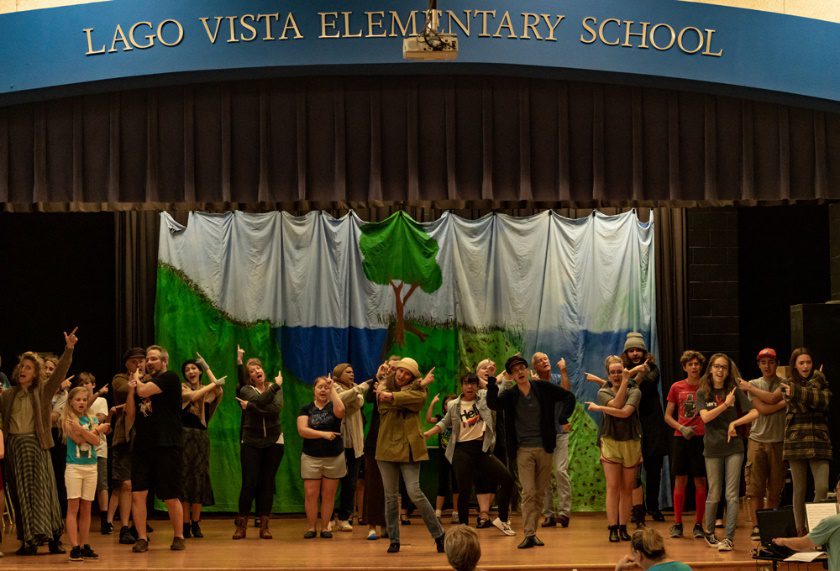
By Sean McCormick
Come on, kids, we got some rehearsing to do.
—Babes in Arms
Over the years, “community theater,” a term coined by author and director Louise Burleigh in 1917, has often been depicted in an awkward light: uncomfortable venues with poorly-functioning or no sound systems, anemic or thunderous air-conditioning, ramshackle set pieces and flats, overused costumes and aging, over-emoting actors struggling to recall their lines. The humorous online newspaper The Onion has published a few satirical gems: “Homeless Man Describes Horrors Of Sleeping In Public Park During Community Theater Production Of ‘The Tempest’”, “Wrinkly, Oversized Trench Coat Returns To Stage For 34th Season With Local Community Theatre” and more recently, “Judge Sentences Lori Loughlin To 100 Hours Of Community Theater.”
Filmmaker Christopher Guest, best known for his role of Nigel Tufnel in the iconic rockumentary “This is Spinal Tap”, made a feature film called “Waiting for Guffman” in 1996 about a fictional community theater in Blaine, Missouri. The title is a nod to the Samuel Beckett play, “Waiting for Godot”, which has been a longtime staple of community theater. Guest found the inspiration from watching his daughters perform in a production of “Annie, Get Your Gun.” “I was just drawn to the idea of how earnest everyone was, how devoted they were to do the best performance they could, albeit at the level that they were working at. There’s something charming about the expenditure of energy to watch these amateurs,” Guest explains in the film’s DVD commentary.
These observations have been going on for decades. Michael Green, a journalist from the U.K, where community theater or theatre is often referred to as “amateur theatre”, and sometimes in the pejorative as simply, “am-dram,” wrote a very funny book entitled “The Art of Coarse Acting” in 1964. It lovingly pokes fun at the idiosyncrasies of community theater and the public perception of the “amateur actor.”
I have to confess, for most of my life I’ve been in the camp that is quick to point out the foibles of community-produced productions. This is flat-out heresy, considering my upbringing. My parents met at an audition for a 1963 production of “Oklahoma!” at the Peninsula Playhouse in New Braunfels, Texas. My father was the audition accompanist. My mother wasn’t cast but they did the musical Bells are Ringing the following year, also at the Peninsula. They were married in 1965.
During the 1970s-80s my parents were very active in the Fort Worth theater community (which is surprisingly large — Texas has over 400 non-profit theaters, Fort Worth has at least 20). They were often involved with Casa Manana, Stage West, Circle Theatre and Scott Theatre. They jointly received a lifetime achievement award from the Live Theatre League of Fort Worth in 1999.
In the Fall of 1985, I was in my second semester at the junior college where my parents were faculty members, plodding through general education and fine arts classes in a desultory fashion (my plan was to be the drummer of KISS or something, so school was a distraction back then). I had signed up for a course my mother taught called Musical Theater Workshop. I had been taking this class since I was six or so, only this time I was eligible to receive college credit for it. The class project that semester was to collectively audition, rehearse, produce and perform the Stephen Schwartz musical “Working.” Thankfully, I landed an “A” in the class. Had I not, it would have been like the line in Cheech and Chong’s song, “Mexican Americans”: “Mexican Americans, love education so they go to night school and they take Spanish and get a B.” 38 years would pass before I would don a costume and tread below a theater’s arch again.
One of my parent’s passions was to see shows on and off-Broadway and they routinely made an eastbound hajj to the Big Apple to get their fix. My brother and I got to tag along a few times and that’s where I believe my performing arts snobbery began. Getting to experience theater done at its highest level is like witnessing a Tom Brady touchdown pass or hearing Prince riffing a guitar solo in person. The bar can be none higher. It’s a freight elevator drop to go from that to spectating at a Y.M.C.A. flag football game or having to listen to a burned-out cover band at a cash-bar wedding reception. Enduring a high school offering of Our Town is a far cry from viewing Les Misérables at the Palace in London (which I fortunately got to do in 1988).

In 2004, when my parents found out they were finally going to be grandparents, they retired from academia and searched for a place to hang their hat that would be close to my then-wife and me in Austin. They settled on a little lakeside town outside of Austin called Lago Vista. It was originally designed as a retirement community in the 1980s, but has now become a combination of families, retirees, and vacation homes. It also has a surprisingly active arts community, including The Hill Country Singers, the Twilight Concert Series, the Lake Travis Music Theatre, and the Lago Vista Players.
The Lago Vista Players was created in 1989 by Jean Clause and was the first community theater company in the area. Once my folks had moved into town, it didn’t take them long to negate their retirement. Since moving in, they’ve now directed, played music or acted in over 20 shows, most of which involved the Players. They have also helped with the bureaucracy that is part of keeping a theater company afloat.

According to my mother, starting a non-profit theater group is pretty straightforward, “It’s similar to starting a church, you just need a place to conduct business and some devoted followers.” After that it gets more complicated. A board of directors needs to exist, typically filled by members of the community that have some basic business sense. There needs to be a place to rehearse and a venue to do a show in. The first production in Lago Vista that my parents were both a part of was called, “The Musical Comedy Murders of 1940.” Back then, they had to rehearse in a vacant airplane hangar at the tiny local airport with a trashcan fire going. These days the Lago Vista Players rehearse after-hours in a physical therapy center that’s owned by a friend of the group.
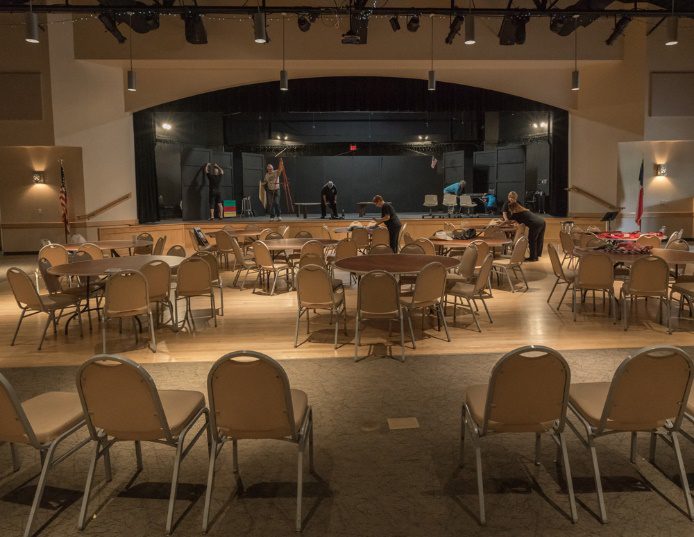
The K-Oaks Clubhouse on bucolic Bar-K drive in Lago Vista is a 10,000-square-foot facility owned by the Lago Vista Property Owners Association and is utilized by the community for private parties, a local sewing circle, line dancers, a garden club, the local Lion’s chapter and used to be the only venue for community theater in the area, as it has a stage and a small light grid. Each Lago Vista Players show runs for four days, Thursday-Sunday. There are only two shows produced per year, since The Players don’t have their own performance space and have to rely on the availability of the clubhouse.
The cost of scripts and show royalties (paid per performance) can vary, depending on how popular a show is at the time. There are public domain shows available, but many of those older works aren’t produced much anymore. The K-Oaks clubhouse is currently $127 per day to rent. Flats (walls) and set pieces that aren’t being reused from previous shows need to be built. Storage for reusable materials costs about $3000 per year. Costumes are needed and whatever can’t be repurposed or made from scratch is often procured from thrift stores. Expensive wireless audio equipment for actor microphones and backstage communication has to be obtained, the Player’s last outlay for those was around $5000. Banners, flyers and other promotional materials cost money. Creating and maintaining a web presence is mandatory these days and sadly, many of them look like they were time-machined from 1997. Playbills (programs) need to be printed. Tickets also need to be created and sold. Much of this is done online these days, for a fee per ticket.
Donors, advertisers and sponsors are critical to the well-being of a small theater company. They can be anything from the local Women’s Club to individuals. One of the property association rangers once personally donated $100, and probably couldn’t afford to do so. The City of Lago Vista usually contributes enough to cover the storage costs per year but not much more.
I can easily picture Thespis, the ancient Greek who is credited as the first character actor, parking his cart outside the K-Oaks Clubhouse, then making his way onto its diminutive stage to deliver a carefully-crafted indictment of the times we live in. In fact, community actors most likely have more in common with Thespis than he would have with a Neil Patrick Harris or an Idina Menzel. Thespis was an amateur who probably had some sort of outside occupation to support himself and his oratory hobby (his background isn’t terribly well-documented). While the K-Oaks Clubhouse has very little in common with the circular, open-air theaters of ancient Greece, it does have traces of the Great Dionysia — if gallons of cheap Chardonnay and slaughtered animals donned as tacky evening wear counts.
Let’s get back to what a lousy, lazy and hypocritical son I’ve been. For the last 13 years, I have successfully evaded getting tapped to do much more than putting a few sound effects together for my mother prior to a show opening, or maybe helping with striking the set (tearing down the scenery and flats) after one of my parent’s shows had wrapped (ended). In my weak defense, for the last 11 years I have been trying to navigate a rocky freelance television and film career which has made for terrible and long hours (which I still grapple with), but I certainly could have done more to participate in the local theater scene.
I had been operating under the specious premise that community theater was a frivolous hobby for those who either couldn’t hack it in the big leagues or were too old to cut the mustard anymore. Those clubhouse shows used to be a trudge for me to sit through, the air-conditioning often rivaled the actors in volume and all I could focus on were the imperfections, like the bizarre age ranges of the people playing young characters and the well-lit exit sign that is center-stage against the back wall that can’t be covered up due to fire code regulations. More than a few times I asked my mother why she endured such hassles to produce productions that are often only viewed by a small contingent of local blue-hairs. Her terse answer was always along the lines of, “This (theater) has been my mission since I was a child.”
An event occurred on January 29th of 2005 that would eventually lead me onto the path of redemption: the birth of my son, Ivan. He was an entertaining toddler, but later became a very shy boy in public who chose to keep his personal cards close to the vest. We couldn’t get him to perform for anyone, not unlike the owner of Michigan J. Frog trying to prove his stoic frog was extraordinary to that talent agent. After his mother and I divorced in 2012, Ivan and I joined my parents in Lago Vista, where I purchased a home two minutes away from them. While he transitioned to the new school district successfully, I hadn’t had much luck getting him involved in theater, aside from a couple of week-long P.T.A.-based day camps, both of which produced unwatchable shows that are best-left buried in my Adobe Lightroom catalog. After spring break of 2017, everything changed.
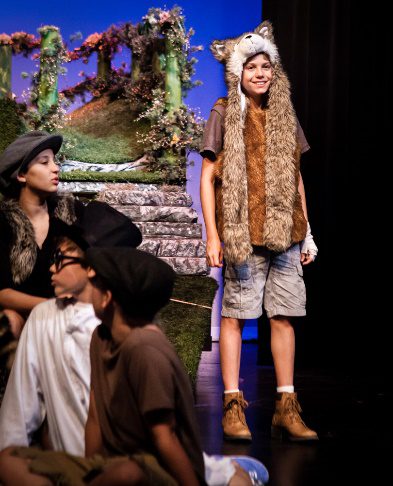
The musical counterpart to the Lago Vista Players is the Lake Travis Music Theatre company. Formed in 2007 by Barbara Graham and Bill Parcher, the group produces a well-known musical every summer. Often the cast-size exceeds 50 people and they tend to pick shows that ensure actors of all ages will be able to participate in some way. These days they rehearse after-hours at the Lago Vista Elementary School and perform at the high school’s performing arts center, aka the ‘PAC.’ In 2017, the musical they chose to produce was Peter Pan. Unexpectedly, my son signed up to audition and he brought a fellow 6th-grader along for moral support. I stayed out of sight while he did a cold read and sang an off-the-cuff acapella version of a 21 Pilots song (his favorite group at the time). An odd choice, but the director saw potential and cast him as Curly, one of the Lost Boys. He then joined a youth-based offshoot of the Lake Travis Music Theatre called Rising Stars (a group he had no interest in a year before) and voilà, he was ‘hooked.’ A year later, he had two shows under his belt; the other was a youth version of Beauty and the Beast, in which he played Lumière, French accent and all. In less than a year, he had transformed into a confident and outgoing young man.
In March of 2018, it was summer musical audition time again. This year the show was “Oklahoma!” and Barbara Graham, the director, had asked me if I would be interested in participating, since my son would most likely be in it and my father was going to be directing the music. I hadn’t been involved in a musical since the mid-1980s and my schedule was horrific, but I still agreed to look into it, thinking I could just be a cactus or something.
On audition day, I lurched into the children’s dance studio where the Lake Travis Music Theatre’s auditions are always held, expecting to have a quick conversation about scheduling and then hopefully be able to leave as I was navigating a flu bug at the time. I plopped down in the narrow hallway to await my turn. I could hear a girl singing beautifully through the door to the studio and I was thankful I wasn’t going to have to do anything like that. Someone handed me a clipboard. On the paperwork where it asked what character you’d like to audition for, I jokingly scribbled “Sweeney Todd.” I was not taking things seriously at all. Then it was my turn. To my unexpected horror, I soon found myself singing, doing a cold read and having to dance with the assistant director. I quickly reentered my bed after I escaped and thought no more of it. The next day, my phone rang. It was my father. “Keep this under your hat for now, but Barbara wants you to play Jud,” he told me in a voice that was all smiles.
For those unfamiliar with “Oklahoma!”, Jud is the antagonist of the show who is in several scenes (including two fight scenes) and has to sing a forlorn song by himself on stage. It’s a big role, and I’ve never considered myself a crooner. I had a bit of an anxiety attack when I realized the scope of the part, plus I was going to have to break the news to my girlfriend, who was already unhappy about my schedule. My inner accountant was already calculating how much work I was probably going to have to turn down during the week of dress rehearsals and the two weekends that performances are scheduled for. But I agreed to do it. The Lord hates a coward, plus, how many times does one get to participate in a creative endeavor with two other generations of their family? My boy was feeling secure in the theatrical process at this point, so I didn’t feel like I was stepping on his toes, which was an important consideration for me. I didn’t want to do anything to jeopardize his decision to favor theater over running head-first into other kids on the gridiron.
Once the cast was announced, they organized a potluck dinner and a table read where everyone was seated in a large circle. Right away, I was taken aback at how much this felt like a family event, based on how everyone was interacting. As our newly minted cast slowly made our way through the script, I felt like a complete impostor, even though I had cursorily known many of them for years. It dawned on me that I hadn’t yet earned my place in the group, so I resolved to change that.
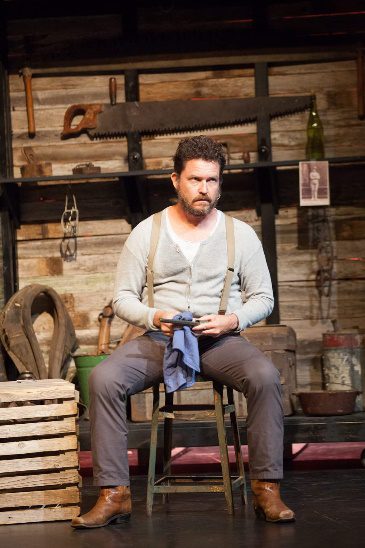
I grew my first beard in 50 years. I signed up for vocal lessons via Skype from a guy on YouTube. I downloaded Hugh Jackman’s version of “Oklahoma!” (he played the lead, Curly) and put silence where my lines were, so I could virtually rehearse with Jackman in my car or in my headphones on the many walks I take in my neighborhood. I remember on one such walk rescuing a turtle and having to carry him half a mile to the lake while I was rehearsing my lines which made me look like a total crazy person. I lined up a stuntman friend to come out and choreograph the fight scenes, which he did for free, as he liked that I was doing the show with my dad and my son. I never screwed around at rehearsals and tried to set a good example for the youngsters in the ensemble (who were a little afraid of me, thanks to my character being kind of intense). Despite all my efforts, I was hyper-aware that I was playing catch-up with the very talented individuals playing the other principle roles. I was scared and humbled on a daily basis.
I was having to commute back and forth every weekend from a movie I was doing sound on in Houston, but I didn’t mind at all. I found I had fallen in love with the process, much like my boy had the year before. Getting to collaborate on such a project with my newly teenage son without him being resentful of my presence or rolling his eyes was everything I had hoped for. I was blown away by how much talent was in the ensemble, who had been putting in so many hours for no financial compensation, rehearsing for eight-plus weeks on a child-sized stage in an elementary school cafeteria where the air-conditioning might or might not be on in summer temperatures. Because, for most, it was an important, family-centric experience. The teenage girl who was wonderfully playing Ado Annie had been a shy kid, like my son. “Community theater changed my life,” she told me after rehearsal one evening.
With the performances a week away, it was time to move our production out of the humid elementary school and into the performing arts center. I finally felt I had earned my way into the tribe. I was now prepared and addicted.
The two weeks of shows went well, despite one performance when my knife flew across the stage during one of my many choreographed falls (which is why I carried two). It all blew by far too fast and I was left with a big empty inside. It was similar to the feeling I get when I wrap up a lengthy film project as a technician, but it cut a little deeper as a performer. Getting the chance to be someone completely different than yourself is an extraordinary experience. I was also filled with remorse when I realized how many years of opportunities I had missed out on with my parents that had been right under my turned-up nose.
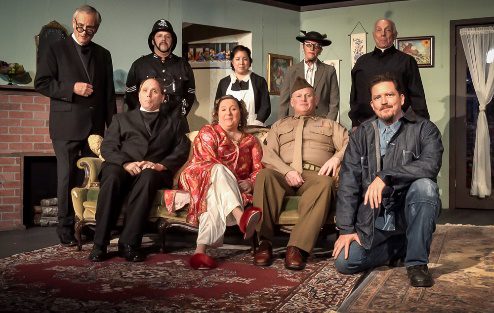
Making up for lost time, I got cast as an escaped Russian prisoner of war in a Lago Vista Players show called “See How They Run”, a 1940s British farce written by Phillip King. This was my debut with the Lago Vista Players and my mother was directing. After 13 years of spectating at the K-Oaks Clubhouse, I was finally on the other side of the proscenium. Good thing, too, as it was most likely the end of my mom’s tenure as director for the Players. Her eyesight and overall health has dictated that a break is in order. Her former assistant Annie Febbo is directing the Player’s current show, “The Desk Set”, with my mother sort of being her Yoda. I am in this show as well, surprise surprise.
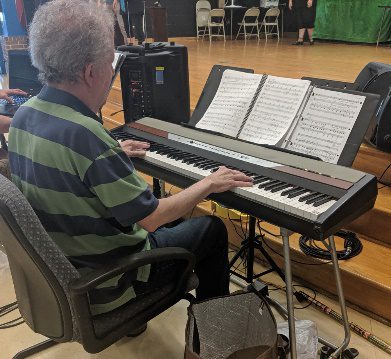
On the topic of failing health, my 75-year-old father (after years of countless tests) was finally diagnosed with Alzheimer’s. This last summer, the Lake Travis Music Theatre produced the musical “Annie”, and it was most likely my father’s last as music director. He had a TIA (a small stroke) at the beginning of 2018 but somehow rallied enough to direct the music and play the piano for “Oklahoma!”. This year has been different. At our first big rehearsal for “Annie” he had to leave halfway through, as he was having temporal dislocations and was unable to keep up with the sheet music. Something that has never happened in over six decades of professional playing.
A month into the process, he drove his car into a ditch after an evening rehearsal, and somehow neither he nor the car was damaged. As a backstop this year, we implemented a computer-based score assist software program to augment his piano and the other two orchestra members, which took a lot of the pressure off of him. When the curtain dropped on our final performance of “Annie”, I breathed a huge sigh of relief, thankful that he was able to successfully bookend such a prolific career. His contributions to the performing arts out here will be greatly missed by the community.
There are some who predict that fine arts are obsolescence-bound. It’s true that school districts are slashing budgets and cutting programs, concentrating on standardized-testing and STEM subjects, but recent Brookings Institute research shows that incorporating the arts into school curriculums can facilitate a better understanding of society, improve communication skills and provide a motivation to stay in school. Community theater facilitates a safe, creative, fun, collaborative and multi-generational learning environment that teaches self-discipline, social skills, respect, empowerment and empathy. Schooling little ones to be a positive component of something larger than themselves is a valuable lesson. Even if they manage to eradicate fine arts programs from public schools, I predict communities will continue to provide them. Every moment I’ve spent with my new friends and family, every memory created in that process has created value that transcends any tangible compensation. While I regret what I’ve missed out on, I’m going to channel Dr. Seuss and be glad I’m currently heading in the right direction with my son.
We are currently neck-deep into rehearsals right now, so I need to go run my lines again. I’ll leave you with an old quote that comes up when people say (like I used to) that community theater is trivial and quaint: “Professionals built the Titanic; amateurs built the Ark.”
